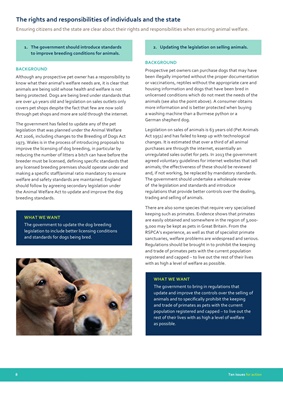
8 Ten issues for action
2. Updating the legislation on selling animals.
BACKGROUND
Prospective pet owners can purchase dogs that may have
been illegally imported without the proper documentation
or vaccinations, reptiles without the appropriate care and
housing information and dogs that have been bred in
unlicensed conditions which do not meet the needs of the
animals (see also the point above). A consumer obtains
more information and is better protected when buying
a washing machine than a Burmese python or a
German shepherd dog.
Legislation on sales of animals is 63 years old (Pet Animals
Act 1951) and has failed to keep up with technological
changes. It is estimated that over a third of all animal
purchases are through the internet, essentially an
unregulated sales outlet for pets. In 2013 the government
agreed voluntary guidelines for internet websites that sell
animals; the effectiveness of these should be reviewed
and, if not working, be replaced by mandatory standards.
The government should undertake a wholesale review
of the legislation and standards and introduce
regulations that provide better controls over the dealing,
trading and selling of animals.
There are also some species that require very specialised
keeping such as primates. Evidence shows that primates
are easily obtained and somewhere in the region of 3,0009,000
may be kept as pets in Great Britain. From the
RSPCA's experience, as well as that of specialist primate
sanctuaries, welfare problems are widespread and serious.
Regulations should be brought in to prohibit the keeping
and trade of primates pets with the current population
registered and capped - to live out the rest of their lives
with as high a level of welfare as possible.
WHAT WE WANT
The government to bring in regulations that
update and improve the controls over the selling of
animals and to specifically prohibit the keeping
and trade of primates as pets with the current
population registered and capped - to live out the
rest of their lives with as high a level of welfare
as possible.
The rights and responsibilities of individuals and the state
Ensuring citizens and the state are clear about their rights and responsibilities when ensuring animal welfare.
1. The government should introduce standards
to improve breeding conditions for animals.
BACKGROUND
Although any prospective pet owner has a responsibility to
know what their animal's welfare needs are, it is clear that
animals are being sold whose health and welfare is not
being protected. Dogs are being bred under standards that
are over 40 years old and legislation on sales outlets only
covers pet shops despite the fact that few are now sold
through pet shops and more are sold through the internet.
The government has failed to update any of the pet
legislation that was planned under the Animal Welfare
Act 2006, including changes to the Breeding of Dogs Act
1973. Wales is in the process of introducing proposals to
improve the licensing of dog breeding, in particular by
reducing the number of litters a bitch can have before the
breeder must be licensed, defining specific standards that
any licensed breeding premises should operate under and
making a specific staff/animal ratio mandatory to ensure
welfare and safety standards are maintained. England
should follow by agreeing secondary legislation under
the Animal Welfare Act to update and improve the dog
breeding standards.
WHAT WE WANT
The government to update the dog breeding
legislation to include better licensing conditions
and standards for dogs being bred.